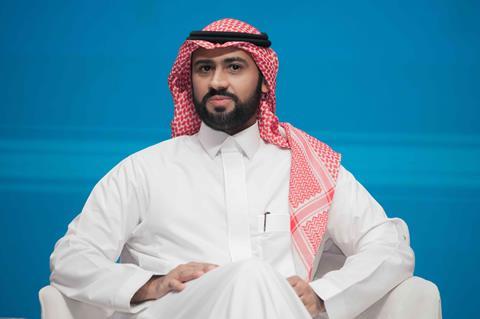
Many years ago, Faisal Baltyuor went on a school trip to an exhibition by oil giant Saudi Aramco, where he saw a 3D film that explained how the company extracted oil. This was long before cinemas had started to open in Saudi Arabia in 2018, and Baltyuor had — unsurprisingly — never seen a 3D film before. He remembers being struck by the quality of the production: “It was magic for me — at that time, I just thought I wanted to do something similar.”
The experience sowed a seed in the executive, who has since established himself as one of the pioneering figures in the nascent but fast-growing Saudi film industry: he was the first head of Ithra Cinema and the first CEO of the Saudi Film Council, the government body founded to support the local film industry as it started to open up.
Baltyuor is founder and CEO of leading distributor CineWaves Films, which has the biggest library of Saudi films. At the same time, he is CEO of Muvi Studios, the production arm of top Saudi exhibitor Muvi Cinemas, and a board member of Manga Productions, an animation and video-game specialist and a subsidiary of Saudi crown prince and prime minister Mohammed bin Salman’s Misk Foundation.
As one Arabic newspaper recently put it: “Look back at any of the key moments in the development of the now flourishing Saudi film industry, and it is likely you will encounter Faisal Baltyuor.”
The executive recalls being “obsessed” with 3D animation at secondary school in the late 1990s, teaching himself animation techniques and eventually working on projects for a number of Saudi companies. There followed a spell in Australia, where he studied computing at Western Sydney University. He later took a master’s degree at Australia’s University of Newcastle, working at the same time for a number of the country’s production companies on documentaries, commercials and corporate films.
All this helped lay the groundwork for his career in the Saudi film industry, which took off when he joined Saudi Aramco in 2015. After working in animation and graphics production for the company, he was appointed project leader of Saudi Film Days. This was a groundbreaking 2016 initiative by Saudi Aramco’s King Abdulaziz Center for World Culture (Ithra) to support and showcase short films by up-and-coming Saudi talent — right at the moment the country was starting to open up.
Among the filmmakers supported were directors who are now prominent figures in the Saudi film scene such as Telfaz11 co-founder Ali Alkalthami, whose dark comedy Mandoob premiered at Toronto, and Meshal Al Jaser, whose thriller Naga was also a Toronto premiere. Both films are playing at this edition of Red Sea International Film Festival.
The education focus continued at the Saudi Film Council, which Baltyuor led from 2017 when it was set up by the government to develop the local industry. A key focus was “how to create the industry from a talent perspective”, he explains.
Thousands of students were sponsored to study filmmaking, either in prestigious international schools or on specialist courses in Saudi Arabia. The industry’s international outreach also began on his watch: Saudi made its debut at Cannes in 2018 with its first pavilion at the festival.
Launch pad
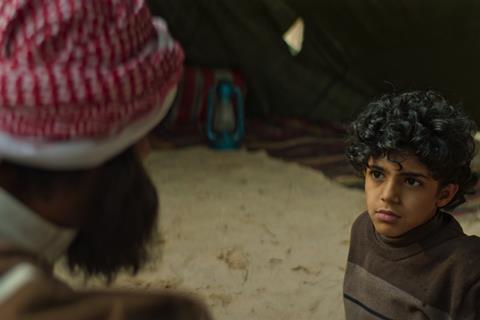
After two years in the job, Baltyuor switched from the public to the private sector, launching CineWaves Films. “At the end of the day, I’m a producer,” he says. “I also needed to be more active from a private perspective, because what will sustain the industry here is the private sector.”
The obvious choice, he says, would have been to set up a production company. But he felt that distribution was a missing element in Saudi. “At the time, we had lots of calls from both sides — film producers were looking for distribution, either into cinemas or onto platforms. And I was also getting contacted by the platforms, looking for Saudi content.”
CineWaves had early success with The Book Of Sun, the first Saudi film to achieve more than 100,000 local admissions in 2020. It also released Khalid Fahad’s Valley Road, the closing film of last year’s Red Sea. CineWaves’ slate also includes Iraqi director Ahmed Yassin Al Daradji’s Baghdad-set feature Hanging Gardens, winner of the best film award at Red Sea last year and Iraq’s submission to the Academy Awards for best international feature. The company also co-produced Mohamed Kordofani’s Goodbye Julia, the first film from Sudan ever to play in Cannes’ Un Certain Regard — and the country’s Oscar submission.
Moreover, CineWaves is a significant supplier of Saudi content to Netflix: 13 of its films played on the platform in October. CineWaves has 16 titles at this year’s Red Sea: 12 playing in the Saudi section, one in the families and children section, and three in the short-film competition. It also sponsors the Red Sea Souk’s $50,000 CineWaves Film Distribution Award.
For Baltyuor, however, “it is not about numbers, it is about working together again and again with the same filmmakers,” building relationships with Saudi talent as they move up from short films and into features. “We work with talents, making our journey together so that we have a vibrant industry. It’s a win-win situation.”
Audience pleaser
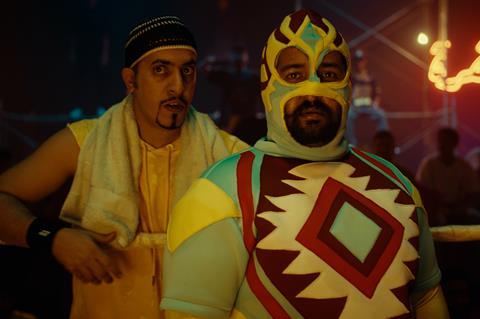
CineWaves’ focus on Saudi films comes as local productions start to draw more audiences in the country. Hollywood and Egyptian films still dominate the local box office (Top Gun: Maverick was the top film in 2022, followed by Egyptian title Bahebak), but the big story of 2023 has been the commercial success of Saudi action comedy Sattar, which has sold more than 900,000 tickets and taken $11.2m at the Saudi box office.
CineWaves did not distribute Sattar (which was handled by Front Row Filmed Entertainment), but Baltyuor had a hand in its success as CEO of Muvi Studios, which co-produced the film alongside Telfaz11. Baltyuor launched the production arm of leading exhibitor Muvi Cinemas in 2022 after working with Muvi on the distribution of CineWaves films. “Muvi were a big supporter of Saudi cinema and we had multiple successes together, including on The Book Of Sun,” recalls Baltyuor. “Over the years working with them, we had discussions about their interest in getting into production.”
The division has had success with both Sattar and Egyptian film Two For Rent, with both films reaching a combined 1.2 million admissions at the Saudi box office within the first four months of 2023, according to Baltyuor. Both films also went to Netflix after their theatrical run.
The results show the potential for producing homegrown content, says Baltyuor, although as yet no further Muvi Studios projects have been announced. “We are working on certain films,” he says. “But we are taking our time, reviewing the scripts before we start shooting. Next year, we will have a couple of films that should be released.”
He will not be drawn on the number of films Muvi Studios would like to produce. “It’s not about the number, it’s about the quality,” stresses Baltyuor.
Across the board, he notes the quality of Saudi films is on the rise. Abdulelah Alqurashi’s Alhamour H.A. has been selected as this year’s entry for the best international feature Oscar. Looking ahead, he says the competition to be picked next year will be fierce, not only because of the number of productions — but also because of their quality. Many of them have not been released in cinemas in 2023, so were not eligible this year. Indeed, multiple Saudi films have played at festivals this year, including Naga, Hajjan and Mandoob at Toronto alone.
The growth of Saudi production is “one of the results of all the initiatives led by the Saudi Film Commission [to develop the industry], in addition to Neom, AlUla, the Cultural Development Fund, the Red Sea Film Festival, the Red Sea Film Fund and Ithra, as well as private initiatives,” says Baltyuor, who clearly intends for CineWaves and Muvi Studios to continue supporting Saudi filmmaking in the long run too.


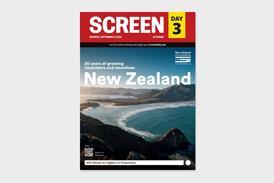






![[Clockwise from top left]: 'The Voice Of Hind Rajab', 'A House Of Dynamite', 'Jay Kelly', 'After The Hunt', 'The Smashing Machine'](https://d1nslcd7m2225b.cloudfront.net/Pictures/274x183/1/7/0/1459170_veniceawards_837515.jpg)







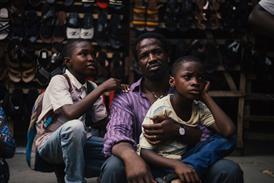







No comments yet